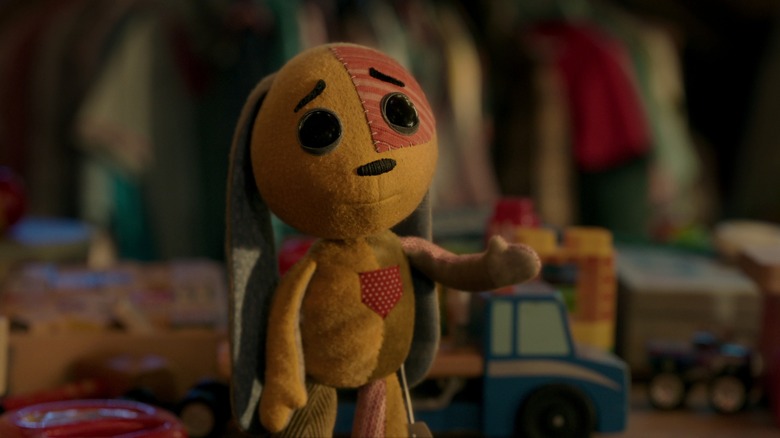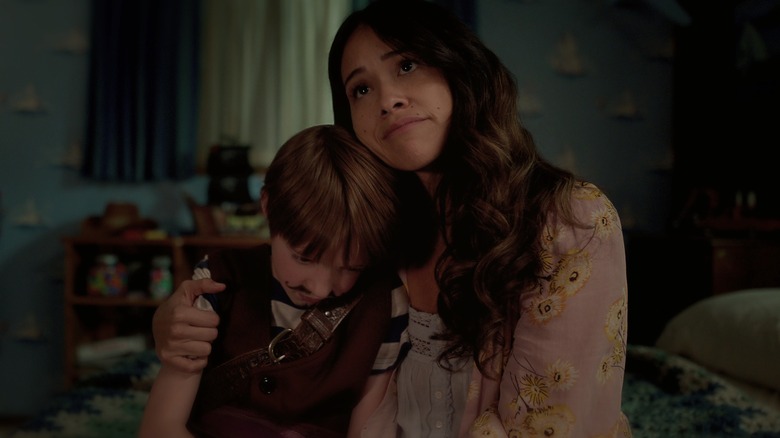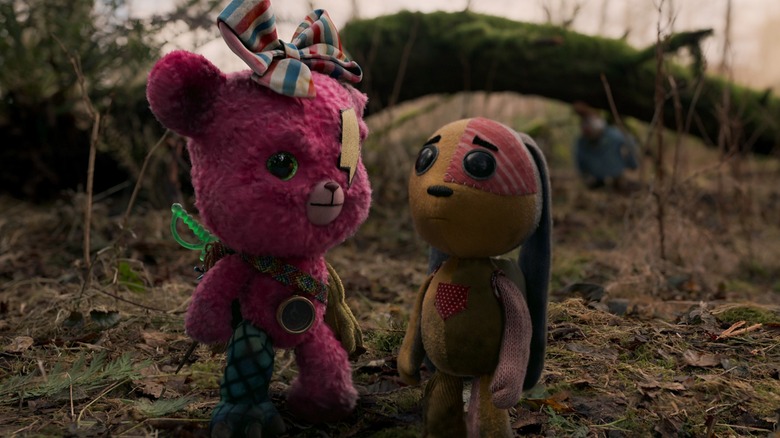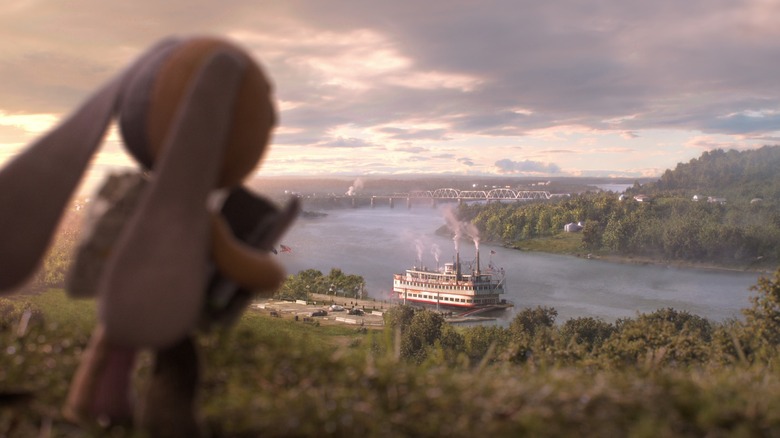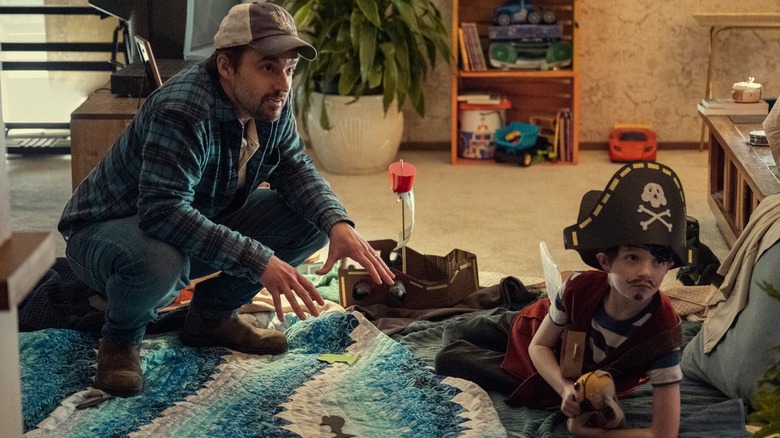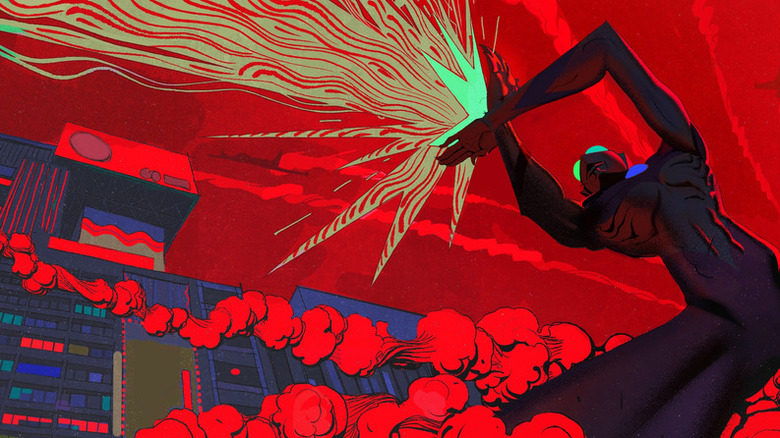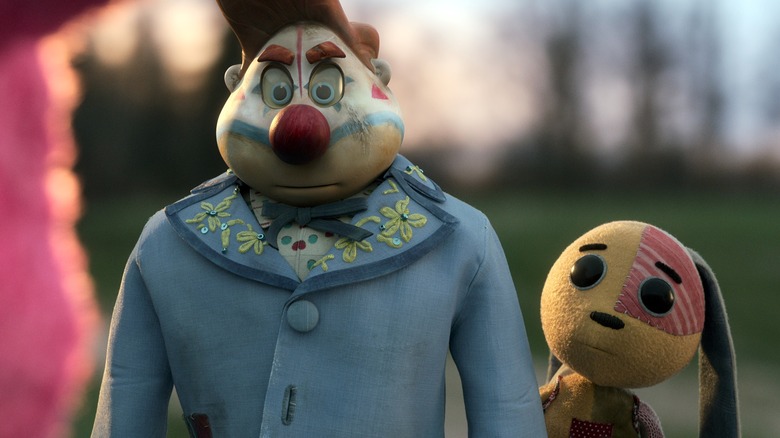Lost Ollie's Shannon Tindle On Telling Stories That Matter, Working With ILM & More [Exclusive]
"Lost Ollie" is Netflix's latest limited series, an animation/live-action hybrid with a narrative that will be familiar to everyone who has seen "Toy Story" or "The Velveteen Rabbit." It follows a patchwork bunny who has lost his human and best friend, Billy, and subsequently embarks on an epic adventure to be reunited with him.
The series packs more emotional gut punches than any warning can prepare you for, but it is still a delightful and fun adventure in the vein of a Mark Twain novel. It also has an incredible cast that includes Jonathan Groff, Tim Blake Nelson, Mary J. Blige, Gina Rodriguez, and Jake Johnson. Sure, the mid-point can be a bit repetitive and slow, but the pay-off of the show can easily cue the waterworks. In her review for /Film, Shania Russell wrote: "'Lost Ollie' doesn't need to be a grand epic or end-of-the-world type quest. It's still a beautiful reminder of what it feels like to be wandering and what it truly means to find your way home."
Ahead of the show's premiere, we spoke with creator Shannon Tindle about the thematic similarity between "Lost Ollie" and "Kubo and the Two Strings," working with ILM on the animation, the importance of music to the story, and much more.
'Stories are a way to memorialize folks that we love'
There are some thematic similarities between "Lost Ollie" and "Kubo and the Two Strings," particularly in how it deals with grief and how we carry the memories of lost loved ones. Is there something in that particular theme that appeals to you as a writer?
I like stories that matter and I like stories that I think can heal. I'm at the point in my life where I'm losing more family members than I'm gaining, and it's been an emotional time. With "Kubo," the emotional elements of that were inspired by two things: my grandmother's battle and my aunts and uncles with Huntington's disease and losing your memories and things like that, and my mother-in-law coping with the same thing and infusing that into the story.
With "Ollie," I think it's just something that we don't talk about enough. And especially in family material, it gets labeled "dark" and it's like, "No, it's not dark. It's just a fact of life." We lose people. And I think because we don't talk about it and we don't cope with it, we are not prepared for it. And it makes the grief harder. It makes the grieving process and the healing process harder.
I know that also, at the core of the book, there is a throughline. I'd worked with [writer and artist] Bill Joyce prior and was lucky enough to be able to meet his wife, who's since passed. And unfortunately his daughter passed as well. I think writing [2016's "Ollie's Odyssey," which served as the basis for this series] was part of healing for him. So then that's just two people dealing with grief and coping with it and using story to help others.
I think I'm doing two things: I'm trying to share something that can help folks, and I think it also helps me to cope with it and heal as well. Because when the trailer came out, I got lots of texts and emails from my cousins and aunts and uncles because they recognize my grandmother's name in the show, or my uncle who's gone on. His name is in the show. And it was an emotional thing for them. And I think if we can preserve ... [director and executive producer] Peter [Ramsey] will probably talk about — Peter lost his father just before shooting began, and his father's name is hidden in the show. So I think stories are a way to memorialize folks that we love. And it's just something that I'm fascinated by and I think we should talk about more.
'It has to be totally believable'
Many people learned about the history and achievements of ILM through the recent docuseries. How was working with them on "Lost Ollie?"
When these projects start and when you get a green light, you're like, "Okay, who are we going to work with?" And ILM was, of course, on the list. At first, I wasn't sure if we could actually afford them for the show, but what's incredible about ILM is they usually do it right the first time. So you don't have to do a lot of retakes.
And early on, our producer at the time, Rita Peruggi, an incredible producer. She ran [The Jim Henson Company] for a long time, and she's just an incredible lady. She had just worked with Hayden Jones, who is my visual effects [supervisor] on this and with Stefan Drury on ["The Dark Crystal: Age of Resistance"], because she was the producer on that. And she's like, "These are the guys you need to work with. These guys right here."
We immediately bonded. They just understood the material as required. We have to have toys who have to be as believable as our live actors, as Gina, Jake, and Kesler [Talbot] on screen. They have to be able to hold up, stand up to, Gina and Jonathan and Mary and Tim. And when you have that as kind of baseline, it makes it easier.
We want an epic scope to this. We want believability down to the thread count detail. We had Scott Johnson, who was our puppet supervisor, who built the fabricated puppets and ILM scanned those and used those as textured servicing reference. When you have a world-class team like that, and they understand the [point] of the stories, we want people to feel something, and this can't feel like an effect for one second. It has to be totally believable. When you work with that level of folks, then — I'll be frank — I got way better than I ever imagined.
'I think Mark Twain was a great mind'
You name-drop Mark Twain on the show. Was he an inspiration for the tone of the story?
Well, that was simply — that came out of just love. I think Mark Twain was a great mind and that really came out of just like word play. "What would a little kid call something?"
Because when we were trying to, like, bread crumb the clues throughout the show, it was, "What can we name this thing so that when we hear it, the audience won't immediately know what it is, so it can be surprising when we find out what it is?" And that specifically — Joanna Calo, who wrote that episode, who is co-showrunner/EP/director on "The Bear," just a phenomenal talent. That was a conversation back and forth between she and I. And I don't know if that was her idea or my idea. I'll give her the credit for it. Because she had some great ideas on the show, but that came out of that. It wasn't necessarily to name-drop Mark Twain. It was more, "What can we say that feels nebulous?" It doesn't feel like the literal thing that we're referencing there.
'They're elements that are essential to filmmaking'
Music plays an important role in the story. How do you work on incorporating music in the show?
I write music and sound into all of my scripts. I think they're elements that are essential to filmmaking that I think often are overlooked. Some of it comes from, too, like I'm a big comic book fan and I love comic sound effects. Well, I'll write those into the script.
But especially where I grew up, a lot of storytelling happens on the back porch where you're singing and you're sharing old mountain songs. So there was always going to be a musical element to it. And I listen to music always when I write, and I listen to songs over and over and over again. And some of those songs have worked their way into the film. One of those is Sarah Bareilles' "Once Upon Another Time." That's a song I listened to constantly. I actually wrote that sequence while listening to that song because it was so perfect. I was like, "Can we please get the rights to that?"
Hank Williams' "I'm So Lonesome I Could Die" was always in there. It was funny, too, because when it was in the script and we were going out for casting, Tim Blake Nelson was our first and really only choice for Zozo. So we were very lucky to get him, but his agent was like — and then we met Tim, and he said the same thing — he's like, "Hey, I want to do this, but I want to make sure I get to sing some Hank Williams in there." And I was like, "Yes, absolutely. If I can give you more, I will." And so Tim would actually ... on the calls, he'd bring his guitar and he'd be playing guitar. And he'd sing a little bit.
But to me, music tells so much story that's not spoken. Even if there are no lyrics, it tells so much of it. And it sets the world in a place. Scot Stafford, who is our composer and who's a good friend of mine, it was important to me that we actually hear some of the musical vernacular of the South where I grew up, and Scot's family is from West Virginia. So he was familiar with the music. He was familiar with the instruments. He actually taught himself how to play [mountain] dulcimer for the score.
The brief I gave him was "Appalachian 'Lord of the Rings.' That's what I want it to sound like." And he delivered. There are times, too, when he supports songs that are on screen with score. So there's that moment where Rosie sings in episode 2 and Scot supports that with score after coming out of an acapella moment. And then the end song in the last episode where we return to dream, Scot supported that as well.
You want to make it all feel of one piece, like tonally it's part of the same thing. Even if you're not selecting the specific genre of music, you want it to tonally match. And tone is such a hard thing to pitch, but if you play a song for somebody and Justine von Winterfeldt ... I'm going to talk about her for a second. She's our music supervisor. She is the queen goddess of playlists. She's working with me on "Ultraman" right now and she'll read the script, she'll give you a playlist, and you're like, "Yes, that is the show." And so you can give that playlist to somebody, they hear it. And even things that I struggle to pitch, they hear the music and they go, "Okay, I understand what you're looking for." So, it's about tone.
'It's very stylized. It's not photo-real at all'
Speaking of "Ultraman," how did your experience as a showrunner and creator here translate to your work directing that movie? What did you take from this experience into that project?
Well, part of it is just the many of the same team members that I worked with on "Ollie "on the ILM side are now on ... Hayden Jones, who's my effects supervisor, is my effects supervisor on "Ultraman." So then you have a comfortable working relationship with one another and you don't have to repeat yourself so many times. It's just great to have that shorthand there.
I mean, at this point, I have a lot of experience with the animation side of it. So the live-action animation side of it was new, but ultimately not that different. Because even though you have plate work and you have lights that are already in there, if you saw the puppet version, it doesn't tell you a whole lot. You're like, "Oh my God, what is this?" And then when you see the characters drop in there and they've been animated and lit, then you're like, "Okay, I understand what we're going for here and what the subtlety is."
But you know, for "Ultraman," the style was totally different. It's very stylized. It's not photo-real at all, but I'm also trying to tell a story that is, on the surface, a big action movie, but there's a lot of heart and emotion to it. And that's what has to come through no matter what the style is. No matter who you're working with. And once again, because ILM understands that, they can deliver on those things.
'They went above and beyond'
Lastly, what was the collaboration like with ILM in terms of specific notes or directions you wanted to convey? What was your process working with them?
What typically happens — I don't know how other live-action directors work, but on animated projects, you're very involved. And since I was a writer and a producer on this as well, I've been thinking about these characters' performances for a long time. I never start off with a technical approach. I'm like, "This is what the scene's about." Very much the same way I would approach it with an actor. "This is what the scene's about. This is what your character wants. This is what they need, and here's how I would like to express that. Let's work together to find the best version of that." Because I don't want everyone come to it and just be like, "Do it exactly this way." I want to be able to allow for other artists, who are great at what they do, to express themselves and to surprise me in ways I wasn't expecting, which you constantly get when you're working with actors.
There's a line read that Tim did that I wrote, and he read it in a way I never imagined it and it was 10 times better. So you want to allow for that process in all steps. So Peter and I both would come in, we'd give a big brief on what the emotion, the scene's about, and then they would kick it back to us and you'd just start to refine it.
Then you get into, like, "If you could grab this a little bit sooner, then that might make us feel this a little bit better." Or "What if we try this?" And when you're moving as quickly as we had to, you're experimenting. You have to experiment on the fly. You're experimenting in shots because there wasn't a whole lot of testing, period. We didn't have that kind of time on the show. So you just kind of have to experiment while you're rolling along.
And again, luckily there were times when we were like, "We really need you to approve this right now." We're like, "If you could just give us one more little..." We call it our wishlist. "Put it in the bucket," we would joke. They were like, "Yeah, yeah. We'll put it in the bucket."
But I have to say in almost every instance, they went above and beyond and they delivered and we got the extras. So I will be forever indebted to them. But it really comes from a place of story and character. It's just, you're directing characters that actually don't exist yet.
"Lost Ollie" premieres on Netflix on August 24, 2022.
